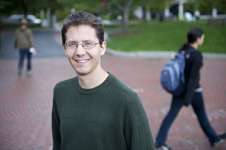Using mathematics to identify the good guys

The Good Samaritan helping an accident victim might really be looking out for himself, argues assistant professor of philosophy and religion Rory Smead.
“I’ll help you not because you’ll help me,” explains Smead, “but because somebody else might help me in the future if he knows I’m a nice guy.”
Smead, whose scholarship focuses on the evolutionary connections between learning, language and social interaction, calls this “indirect reciprocity,” a principal of evolutionary biology in which people who are more helpful are more likely to receive help.
Some scholars have surmised that humans developed language to find out who’s helpful and who’s not, he says, adding that we use language to pass judgment on each other and maintain social norms. In other words, Smead says, people talk about each other to find out who’s a good guy and who’s a bad guy.
“We gossip about each other and hear rumors,” he says. “We’re nice to people who we think are nice and we’re not nice to people who aren’t.”
Smead, who taught at the London School of Economics before joining the faculty in the College of Social Sciences and Humanities, counts himself among a new breed of philosophers who tackle age-old philosophical questions using innovative, multidisciplinary methods of inquiry.
For example, he uses game theory to mathematically capture and analyze behavior in strategic situations in which one person’s success in making choices depends on the choices of others.
These highly idealized mathematical models create remarkably precise representations of strategic interaction, says Smead, but are only accurate to a point.
“Two-faced” cooperators — people who are always nice to other people, but say bad things behind their backs — end up distorting the picture by making bad guys out of otherwise good guys, says Smead.
“If I consider helping you, but heard something bad about you that’s not true, then I won’t help you,” says Smead. “But now somebody knows I’m not nice, so we’re hurting each other because somebody lied.”
One of the goals of his research is to develop a more complete understanding of human language, a remarkably complex communications system compared to that of other animals.
“We have to start by understanding how conventional meaning arises, and take baby steps toward understanding human language,” says Smead, who notes that Vervet monkeys use simple auditory signaling systems to alert each other to dangerous predators.
“One thing we know is that it is fairly easy for all kinds of organisms to develop signaling systems, and the more signals they have at their disposal, the more likely they are to achieve effective communication,” he says.
Provided by Northeastern University

















